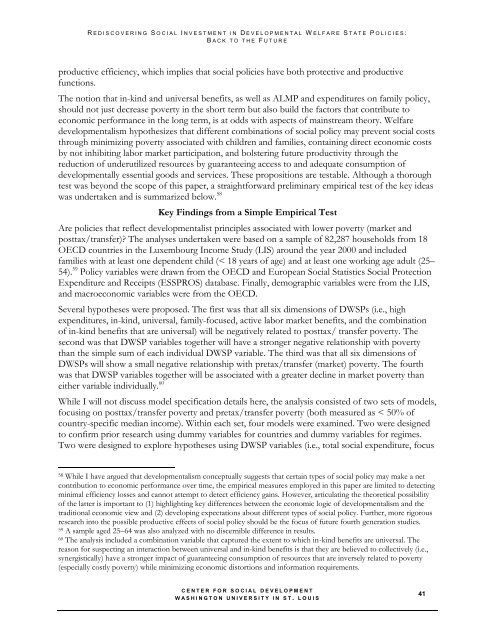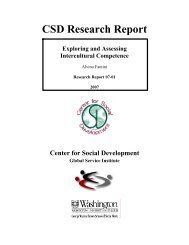Rediscovering social investment in developmental welfare state ...
Rediscovering social investment in developmental welfare state ...
Rediscovering social investment in developmental welfare state ...
Create successful ePaper yourself
Turn your PDF publications into a flip-book with our unique Google optimized e-Paper software.
R E D I S C O V E R I N G S O C I A L I N V E S T M E N T I N D E V E L O P M E N T A L W E L F A R E S T A T E P O L I C I E S :<br />
B A C K T O T H E F U T U R E<br />
productive efficiency, which implies that <strong>social</strong> policies have both protective and productive<br />
functions.<br />
The notion that <strong>in</strong>-k<strong>in</strong>d and universal benefits, as well as ALMP and expenditures on family policy,<br />
should not just decrease poverty <strong>in</strong> the short term but also build the factors that contribute to<br />
economic performance <strong>in</strong> the long term, is at odds with aspects of ma<strong>in</strong>stream theory. Welfare<br />
<strong>developmental</strong>ism hypothesizes that different comb<strong>in</strong>ations of <strong>social</strong> policy may prevent <strong>social</strong> costs<br />
through m<strong>in</strong>imiz<strong>in</strong>g poverty associated with children and families, conta<strong>in</strong><strong>in</strong>g direct economic costs<br />
by not <strong>in</strong>hibit<strong>in</strong>g labor market participation, and bolster<strong>in</strong>g future productivity through the<br />
reduction of underutilized resources by guarantee<strong>in</strong>g access to and adequate consumption of<br />
<strong>developmental</strong>ly essential goods and services. These propositions are testable. Although a thorough<br />
test was beyond the scope of this paper, a straightforward prelim<strong>in</strong>ary empirical test of the key ideas<br />
was undertaken and is summarized below. 58<br />
Key F<strong>in</strong>d<strong>in</strong>gs from a Simple Empirical Test<br />
Are policies that reflect <strong>developmental</strong>ist pr<strong>in</strong>ciples associated with lower poverty (market and<br />
posttax/transfer)? The analyses undertaken were based on a sample of 82,287 households from 18<br />
OECD countries <strong>in</strong> the Luxembourg Income Study (LIS) around the year 2000 and <strong>in</strong>cluded<br />
families with at least one dependent child (< 18 years of age) and at least one work<strong>in</strong>g age adult (25–<br />
54). 59 Policy variables were drawn from the OECD and European Social Statistics Social Protection<br />
Expenditure and Receipts (ESSPROS) database. F<strong>in</strong>ally, demographic variables were from the LIS,<br />
and macroeconomic variables were from the OECD.<br />
Several hypotheses were proposed. The first was that all six dimensions of DWSPs (i.e., high<br />
expenditures, <strong>in</strong>-k<strong>in</strong>d, universal, family-focused, active labor market benefits, and the comb<strong>in</strong>ation<br />
of <strong>in</strong>-k<strong>in</strong>d benefits that are universal) will be negatively related to posttax/ transfer poverty. The<br />
second was that DWSP variables together will have a stronger negative relationship with poverty<br />
than the simple sum of each <strong>in</strong>dividual DWSP variable. The third was that all six dimensions of<br />
DWSPs will show a small negative relationship with pretax/transfer (market) poverty. The fourth<br />
was that DWSP variables together will be associated with a greater decl<strong>in</strong>e <strong>in</strong> market poverty than<br />
either variable <strong>in</strong>dividually. 60<br />
While I will not discuss model specification details here, the analysis consisted of two sets of models,<br />
focus<strong>in</strong>g on posttax/transfer poverty and pretax/transfer poverty (both measured as < 50% of<br />
country-specific median <strong>in</strong>come). With<strong>in</strong> each set, four models were exam<strong>in</strong>ed. Two were designed<br />
to confirm prior research us<strong>in</strong>g dummy variables for countries and dummy variables for regimes.<br />
Two were designed to explore hypotheses us<strong>in</strong>g DWSP variables (i.e., total <strong>social</strong> expenditure, focus<br />
58 While I have argued that <strong>developmental</strong>ism conceptually suggests that certa<strong>in</strong> types of <strong>social</strong> policy may make a net<br />
contribution to economic performance over time, the empirical measures employed <strong>in</strong> this paper are limited to detect<strong>in</strong>g<br />
m<strong>in</strong>imal efficiency losses and cannot attempt to detect efficiency ga<strong>in</strong>s. However, articulat<strong>in</strong>g the theoretical possibility<br />
of the latter is important to (1) highlight<strong>in</strong>g key differences between the economic logic of <strong>developmental</strong>ism and the<br />
traditional economic view and (2) develop<strong>in</strong>g expectations about different types of <strong>social</strong> policy. Further, more rigorous<br />
research <strong>in</strong>to the possible productive effects of <strong>social</strong> policy should be the focus of future fourth generation studies.<br />
59 A sample aged 25–64 was also analyzed with no discernible difference <strong>in</strong> results.<br />
60 The analysis <strong>in</strong>cluded a comb<strong>in</strong>ation variable that captured the extent to which <strong>in</strong>-k<strong>in</strong>d benefits are universal. The<br />
reason for suspect<strong>in</strong>g an <strong>in</strong>teraction between universal and <strong>in</strong>-k<strong>in</strong>d benefits is that they are believed to collectively (i.e.,<br />
synergistically) have a stronger impact of guarantee<strong>in</strong>g consumption of resources that are <strong>in</strong>versely related to poverty<br />
(especially costly poverty) while m<strong>in</strong>imiz<strong>in</strong>g economic distortions and <strong>in</strong>formation requirements.<br />
C E N T E R F O R S O C I A L D E V E L O P M E N T<br />
W A S H I N G T O N U N I V E R S I T Y I N S T . L O U I S<br />
41
















